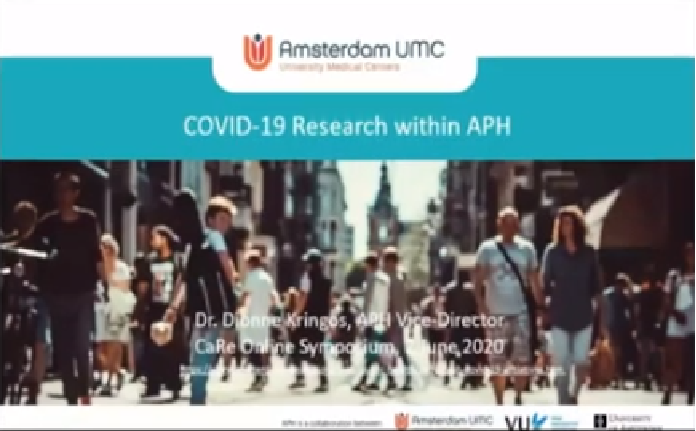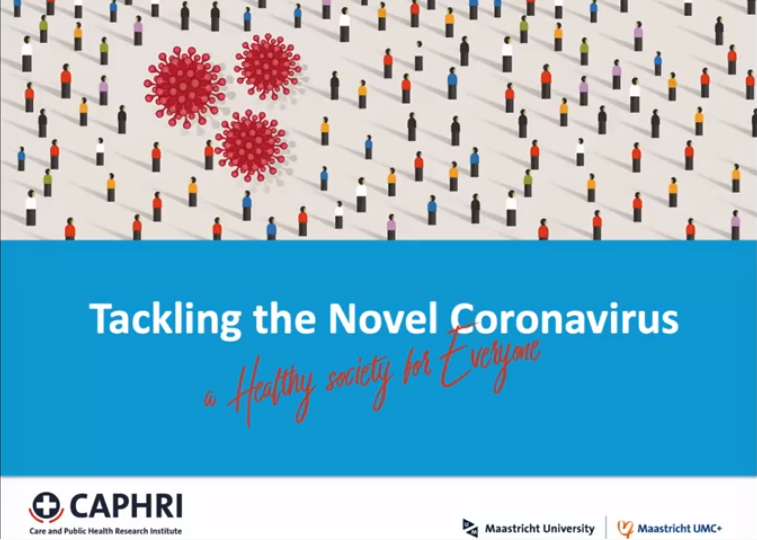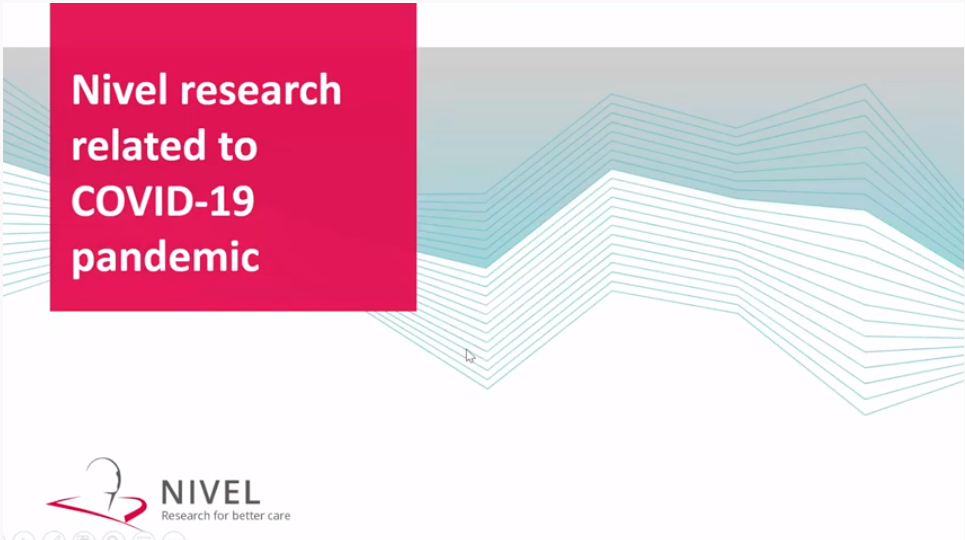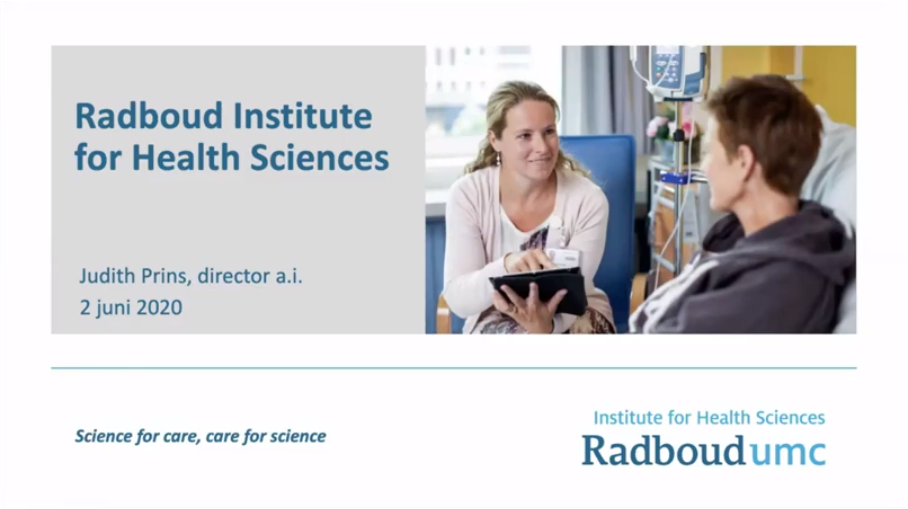Researchers are working on countless different topics. The Corona-related research below is an example of how flexible research needs to be to serve our current society.
On this page you can find an overview on COVID-19 related research within the CaRe institutes.
You can also find the presentations that were given during the CaRe webinar on June 2nd here.
COVID-19 related research in APH
APH COVID-19 initiative: Department of Medical Informatics expands NICE registry to collect data of COVID-19 patients.
The department of medical informatics processes data of all Dutch ICUs in the context of the National Intensive Care Evaluation (NICE) registry. Since the corona outbreak they extended their registry with an online near real-time registration of COVID-19 patients at the ICU which will be linked to more detailed clinical data. The first case mix and outcome report has been released on April 10th and will be weekly updated. RIVM, LCPS and VWS are clients of the COVID-19 information for capacity planning and outbreak surveillance.
More information can be found here>>
APH COVID-19 initiative: COMET – COVID MEnTal Health Survey – Mental health effects of the COVID-19 outbreak – a longitudinal international comparison
For a peacetime society, a virus epidemic is considered to be one of the most difficult and stressful events to manage in terms of public health. The recent COVID-19 pandemic has been forcing millions of people to change their usual life, to work from home, and to practice physical and social distancing. Many people face uncertainty regarding their financial situation, and the risk of being contaminated. It is yet unknown what the mental health effects of the COVID-19 outbreak are.
As reported in several studies conducted during the most recent past virus epidemic (SARS and Ebola), the obligation to keep a safe distance between people and the state of emergency could generate psychosocial consequence as depression, anxiety, posttraumatic stress disorder (PTSD), insomnia, and distress in affected individuals. However, it is yet unclear which variables predict negative mental health outcomes. As far as is known, no studies have yet been conducted examining predictors for adverse mental health responses during a more protracted crisis such as the current COVID-19 crisis in the absence of war or terrorist attacks.
The project called COMET – COVID MEnTal Health Survey has the main objective to evaluate whether the course of mental health symptoms during the current COVID-19 outbreak is predicted by demographic variables (age, gender, education level, profession, degree of economic losses) social isolation, level of exposure to COVID-19 outbreak, pre-existing mental health problems, contamination fear, cultural value orientations and coping strategies. Mental health symptoms will be examined at four waves: Wave 1 (April/May 2020), Wave 2 (3 months), Wave 3 (6months), Wave 4 (9 months).
APH COVID-19 initiative: Research on the well-being of medical residents and how to support them during the COVID-19 pandemic
The COVID-19 pandemic puts enormous pressure on healthcare systems and therefore on healthcare professionals. Physicians have to express a great deal of flexibility, stamina and resilience due to the continuously changing schedules, environment and protocols. In addition, the care for COVID-19 patients can be very stressful, due to the severity of the disease, the lack of treatment possibilities and the fear of virus transmission during the care for these patients. Many initiatives to support these healthcare professionals are undertaken. For example facilitation of webinars on wellbeing and peer groups to share experiences.
A new study has been initiated, of which the primary goal is to support the wellbeing of residents and to monitor whether they feel they are able to provide the usual high quality patient care. This will help understand the impact of the different phases of the pandemic on physician wellness and quality of care. In addition, it will be investigated which wellbeing interventions offered by the AMC are used (most) by residents and how they evaluate them. The findings are instrumental in improving the provision and accessibility of interventions.
In a longitudinal study a weekly online 2-minute questionnaire will be sent to all internal medicine residents and residents from other specialties working on the ICU. Questions focus on residents (physical, mental and emotional) wellbeing, perception of quality of care provided, use of interventions offered by Amsterdam UMC location AMC and helpful activities outside of work.
Registration of COVID-19 in Ysis
To gain better insight into the course of (suspicions of) COVID-19 infections in geriatric/long-term care, all doctors and treatment services that work with EHR YSIS are called upon to participate in the registration concerning COVID-19. By taking part in this registration, participants also receive feedback on the situation in their own organization. All institutions that use Ysis are granted automatic access to this improved registration and also to the dashboards that provide ‘real-time’ feedback.
COVID-19 related research in CAPHRI
Isolation in time of pandemic is a luxury
Milena Pavlova, professor of Health Economics and Equity, wrote a column about isolation during a pandemic.
Remaining isolated in time of pandemic is a luxury. This does not only apply to those with vital professions who continue to serve society. It also applies to low-resource settings, where people have no other choice but to keep on as usual to be able to provide food for the family, irrespective of the health risks, and where access to care is challenging.
Read the full column here.
Staying DEDICATED in times of COVID-19
Sascha Bolt, Judith Meijers, Saskia Wolters, Els Knapen, Lara Dijkstra en Chandni Khema
Normally, the researchers involved in the DEDICATED project, are working on an approach to empower nursing staff in providing palliative dementia care. Now the involved nurses and other care professionals are working around the clock to provide the best possible care, the DEDICATED team is pausing on-site research activities. Instead, they are contributing from behind the scenes. How? Read about it here.
Assessment of Corona Burden Tool
The Assessment of Corona Burden Tool (Corona Ziektelastmeter), developed by Lung Foundation Netherlands and CAPHRI, helps people who were infected with the novel coronavirus to get more control over the complaints they may experience.
Like other respiratory illnesses, COVID-19, the disease caused by the novel coronavirus, can cause lasting lung damage. The recently launched “Assessment of Corona Burden Tool” (Corona Ziektelastmeter), helps people who were infected with the virus to get more control over the complaints they may experience.
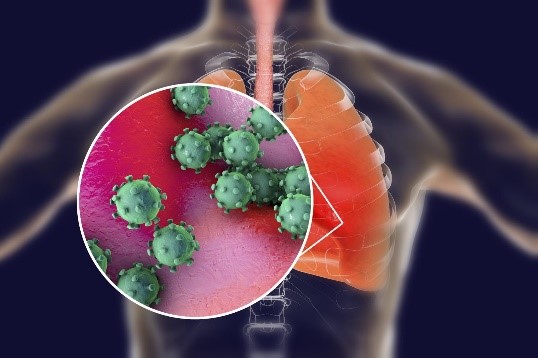
The tool consists of a questionnaire that addresses several possible complaints. It examines the physical, emotional, psychological and / or social aspects that play a role in the perceived burden of disease. The tool provides a simple visualization of outcomes, which gives users insight in the severity of their complaints. If necessary, they can be referred to a healthcare provider. Furthermore, the visualisation helps patients and healthcare providers set a personal goal and make an individual treatment plan. The tool can be used several times to see the developments over time.
This assessment of burden tool has initially been developed for people with the respiratory disease COPD (ABC tool). Studies showed that use of the ABC tool increases quality of life and quality of care in patients with COPD. Together with the Lung Foundation Netherlands, prof. Onno van Schayck and his team adapted the tool for people who have had a corona infection, based on information from the RIVM and studies from abroad. This disease burden tool has not yet been studied within this specific patient group. Therefore is not yet known whether all complaints are included in the tool and whether the severity of the complaints is accurately displayed. It will be validated in the coming months.
For more information on the tool, click here
Biomass use and COVID-19: A novel concern
Megha Thakur, Esther Boudewijns, Giridhara R Babu, Onno van Schayck wrote a paper about their concerns.
Evidence supports the link between air pollution and COVID-19 and thus it is likely that exposure to biomass smoke is associated with COVID-19. The poor, including refugees and migrant workers staying in fragile conditions, are most vulnerable. An outbreak of COVID-19 in a place where the concept of physical distancing is next to impossible could easily overwhelm the public health system. It is thus essential to understand the consequences of being exposed to smoke in relation to COVID-19 infection.
Read the full paper.
A good conversation with André Knottnerus

“Everyone is (rightly) talking a lot about intensive care. But there is a whole pyramid of public health, primary care and home care below it, that we must not forget. I really think the importance of public health was not acknowledged in the past years”.
Read the full interview (in Dutch) with André Knottnerus, Professor Emeritus of Family Medicine, on the coronacrisis here.
Allowing visitors back in nursing homes during the COVID-19 crisis
Eight weeks after the lock down of Dutch nursing homes for visitors, a guideline was developed to cautiously open 26 nursing homes for visitors. The Living Lab of Ageing and Long-Term Care studied how the national guideline was applied in the local context of the nursing homes, the compliance to local protocols and the impact on well-being of residents, their family caregivers and staff. Based on the results, published in this report, the Dutch government has decided to allow all nursing homes in the Netherlands to open their homes using the guidelines.
How to make ethically responsible corona policy?
Peter Schröder-Bäck (RL Creating Value-Based Health Care) was interviewed by Studio Europa Maastricht about the challenges of ethical corona policy in Europe. After studying the effects of the European debt crisis on health, he’s now advising policymakers across Europe on the ethics of responding to the corona crisis. Studio Europa Maastricht stimulates active, critical debate on Europe with citizen engagement at its core.
Read the interview here.
COVID-19 related research in Nivel
Exploration of the current and delayed consequences of COVID-19 for the general practitioner and general practitioner care
Jelle Keuper works at the Nivel programme ‘Health workforce and organization studies’ as a researcher and potential PhD candidate. Currently he works i.a. on an exploration of the effects of COVID-19 for the general practices in the Netherlands.
Relevance of the study
The growing number of coronavirus infections (COVID-19) in the Netherlands since March 2020 has been accompanied by an increasing reliance on acute care. Many Dutch people with corona-related health complaints call on general practitioner (GP) care. It is expected this will put further pressure on the capacity of GP care in the very short term and, hence, access to acute and regular care can be jeopardized. With the support of the Dutch Healthcare Authority (NZa), Nivel maps the current burden on GPs, explores which support is needed and investigates the expectations with regard to deferred care.
Research design
For this study, a questionnaire on these topics was sent to almost all 4,900 Dutch GP practices by e-mail. This was supported by two Dutch GP organizations (e.g. the LHV and the NHG). We asked the GP practices to complete a short web survey, consisting of ten closed and open-ended questions. After the survey was closed, the answers were categorized to analyze the different types of needs and expectations according to region and type of practice. In this way, valuable information can be provided which can serve as input for region-specific and target group-oriented policy and tailor-made support.
Expected results
This study will provide insights into the current needs and deferred consequences of the COVID-19 crisis for GPs and GP care. In addition, we provide targeted information about where support is needed and especially what support is needed. After we have analyzed the results, factsheets and a report will be written which will be shared with GPs, GP practices and GP organizations.
Nivel monitors COVID-19
The Nivel surveillance bulletin weekly reports on the occurrence of infectious diseases in general practices, like influenza, pneumonia and since recently COVID-19. This way the most current state of affairs is constantly reported to the RIVM (National Institute for Public Health and the Environment) and the Ministry of Health, Welfare and Sport.
Yvette Weesie (PhD-student and researcher at Nivels’ Pharmaceuticals program) works on this project and uses large datasets containing information from primary health care providers, including data on health problems and treatment. These datasets are filled with routinely recorded data of the health care provider’s electronic health record systems. Based upon these datasets the yearly and weekly surveillance bulletins are composed. Besides the occurrence of COVID-19, the effects of the pandemic are studied as well. For example, by looking at weekly prescriptions and GP-visits, a potential catch-up on delayed care due to COVID-19 can be monitored.
The PhD-project of Yvette Weesie is about opioid prescriptions in primary care and aims to provide useful information on opioid prescriptions as basis for policy and interventions in clinical practice. She studies trends of prescribing to at risk patients like elderly. Combining information of out-of-office hours GP practices and physiotherapy practices with the electronic health records of one’s own GP, the patient journey of patients with opioid prescriptions can be mapped. In addition, the variation in prescribing between GP-practices is studied and whether or not these variations can be explained by the perspective of GPs on opioids and addiction. Since recently, the potential influence of COVID-19 on opioid prescriptions due to for example the inability to go to a physiotherapist is monitored as well. This can be investigated by looking at trends in prescribing just before and during different stages of the outbreak.
For more COVID-19 related Nivel projects please visit: https://nivel.nl/nl/corona-actueel
COVID-19 related research in Radboudumc
Study on effect of BCG vaccine on coronavirus infection in the elderly
Radboud university medical center and UMC Utrecht are working on a joint research project to discover whether the tuberculosis (BCG) vaccine reduces the risk of infection with the coronavirus in people aged 60 or older, or the severity of the symptoms in the event of infection. A total of 1,600 people may take part in the study, which starts today. Half of the study participants will be given the vaccine, the other half will not.
The elderly have a higher chance of becoming seriously ill as a result of the coronavirus. Also, if infected, they are more at risk of dying from the infection. There is currently no vaccine against the coronavirus, and no other way of protecting the elderly from infection. However, previous research shows that the BCG vaccine protects not just against tuberculosis, but that it can also increase people’s immunity to other viruses.
Scientific research
It is unclear whether the BCG vaccine can also provide some level of protection from the coronavirus. The aim of this study is therefore to find out whether it does. The study should answer the question whether the BCG vaccine provides protection from the coronavirus and/or whether it reduces the severity of the symptoms in the elderly. This is the second study carried out by the Radboud university medical center and UMC Utrecht into the effect of the BCG vaccine on the coronavirus. The first study focused specifically on healthcare workers, whereas this study focuses exclusively on the elderly.
The vaccine
BCG is the most widely administered vaccine in the world and is used in many countries to prevent tuberculosis. For this study, the hospitals will obtain the BCG vaccine directly from the Dutch National Institute for Public Health and the Environment (RIVM). The study will therefore not affect the availability of the vaccine for regular use by the municipal public health service (GGD) in the Netherlands. Participants in the study must be aged 60 or older.
Radboudumc researchers publish new insights into COVID-19. Consequences for treatment are now being examined internationally
Researchers at the Radboud university medical center seem to have found an essential mechanism in the disease process of Covid-19, which has so far been overlooked. If the insight is correct, it probably has important consequences for the treatment of the disease. In an international collaborative effort it is now being investigated whether the new insights and treatments do indeed have an effect in practice.
An infection with the coronavirus Covid-19 is different from the flu or other more common viral diseases. Radboudumc researchers wondered what exactly happens in the case of a severe infection. Doctors recognize three clear phases. In the beginning, patients quickly become short of breath because of fluid in the lungs. About nine days after the infection an inflammatory reaction occurs in the lungs; the patient’s antibodies might attack the virus in the lungs, which can further aggravate the situation in the lung. Some of the patients who recover after a stay in the ICU develop thrombosis and scarring in the lungs due to the long-standing fluid, which makes recovery difficult. In short: it all begins with a fluid problem.
Vanishing ACE2 receptors
“We have been closely monitoring the Covid patients,” says Frank van de Veerdonk. “That first phase, during which the lungs fill up with fluid, CT scans of the lungs look bad and patients quickly experience shortness of breath due to the administration of fluid, is very characteristic. This image cannot be explained solely by the infection of the lungs. So we got the idea that the capillaries, which are the very small blood vessels, start to leak into the lungs during this process. That leakage causes the lungs problems, because they partly fill up.”
This observation was already made with SARS (a previous coronavirus infection that occurred in 2003), but no good explanation was available. Researchers from the Radboudumc now come up with a hypothesis, a theoretical explanation that makes the leakage plausible. Van de Veerdonk: “Covid-19 enters the lungs via the ACE2 receptor. The virus binds to the receptor, which then pulls it into the lung cell where the virus can multiply. In case of a massive infection, this process makes the ACE2 receptors disappear from the outside of the cell. With that, their function also disappears.”
Bradykinine makes blood vessels leak
ACE2 (angiotensin-converting enzyme 2) is known to play a role in maintaining blood pressure throughout the body, which is regulated by the RAAS, the renin-angiotensin-aldosterone system. The RAAS system, and thus ACE2, controls blood pressure by regulating vasodilatation and vasoconstriction. But ACE2 has another function, which up until now has remained out of the picture in coronavirus infections. Van de Veerdonk: “ACE2 keeps the substance bradykinin under control. Bradykinin makes blood vessels leak. We have good reason to believe that with Covid-19 infections we see exactly this effect: when the virus is introduced, ACE2 receptors disappear from the lung cells, giving bradykinine free rein in causing the small blood vessels to leak massively at the site of infection.”
Van de Veerdonk and colleagues recognize this phenomenon from another very rare disease: hereditary angioedema. People with this disease can suddenly develop swelling of, for example, hands, feet, abdomen or face. These swellings can persist for several hours, sometimes even days, after which they disappear just as quickly as they have developed. The cause of these swellings: leaking blood vessels due to too much bradykinin. Some side effects of ACE inhibitors, which are used against high blood pressure, are also very similar to symptoms seen with COVID-19. The dry cough, for example. And in rare cases, angioedema can also occur with ACE inhibitors.
Quick sharing and testing of the insights
The problems of vascular leakage can be aggravated by an inflammatory phase. This causes even more leakage and damage to the lungs. Anti-inflammatory drugs can have a potentially dampening effect here, and doctors and researchers all over the world are doing their best to select the most optimal drugs for this stage. In addition the long lasting vascular leakage and inflammation of the blood vessels will trigger the coagulation cascade leading to thrombosis and eventually scarring of the lungs. Interventions that are started early to treat this leakage have the capacity to prevent these serious complications and might be effective in keeping patients out of the ICU.
Researchers from the Radboudumc have published their insights in an article published on Preprints. Articles on Preprints have not been reviewed and commented on by colleagues, but can therefore be published very quickly. “The latter is very important, because we want to share our vision with everyone as soon as possible,” says Van de Veerdonk. “The so-called peer review by colleagues is in full swing anyway. The article on Preprints has already been viewed over 1800 times and downloaded more than 900 times. Based on this shared knowledge, we are now working on the first treatments with Icatibant, a product that can inhibit the effects of bradykinine. Because for every good idea the corresponding proof must first be provided. At the Dutch national level we are collaborating with the UMC Utrecht, and on an international level with, among others, Remap-Cap. We hope that this will quickly provide us with conclusive information about the insights we have now launched”.
Publication in Preprints: Kinins and Cytokines in COVID-19: A Comprehensive Pathophysiological Approach – Frank van de Veerdonk, Mihai G. Netea, Marcel van Deuren, Jos W.M. van der Meer, Quirijn de Mast, Roger J. Bruggemann, Hans van der Hoeven
https://www.preprints.org/manuscript/202004.0023/v1
Need more information?
Contact us© CaRe 2019 | Disclaimer
